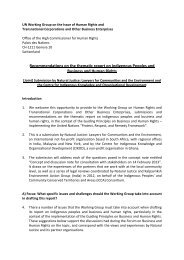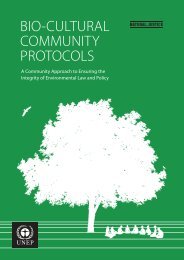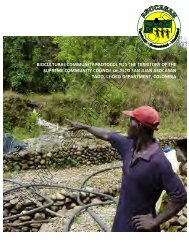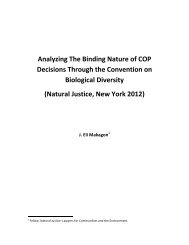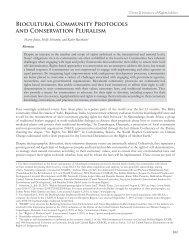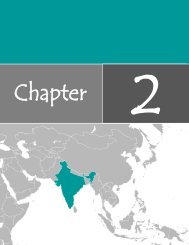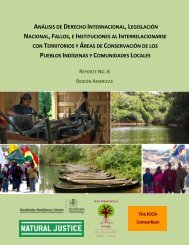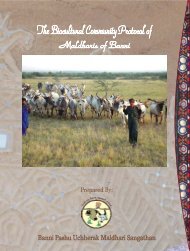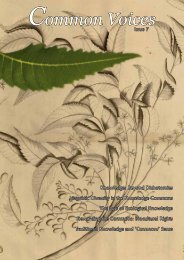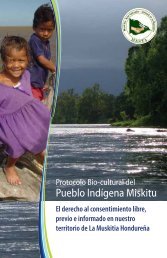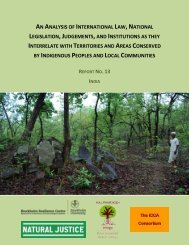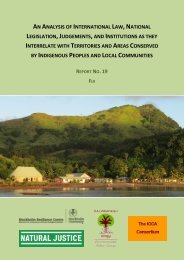English - Natural Justice
English - Natural Justice
English - Natural Justice
You also want an ePaper? Increase the reach of your titles
YUMPU automatically turns print PDFs into web optimized ePapers that Google loves.
communities in national decision-making processes is extremely limited. Of the mechanismsthat do exist, many fail to ensure genuine and meaningful processes of participation,including in particular of Indigenous women. Moreover, legitimate struggles of Indigenousand local leaders against the destruction of their territories, resources and cultures areroutinely criminalized and faced with threats of militarization, extra-judicial killings,kidnappings and detentions. The denial of Indigenous peoples’ and local communities’substantive and procedural human rights – through states’ actions and inactions, often incooperation with corporations or organizations driving the interventions – fuels conflict,degrades ecosystems, and significantly undermines community cohesion.Human Rights ViolationsAs many other countries in theregion, Chile has ratified mostinternational human rights treaties,including ILO Convention 169, and ithas signed the UN Declaration onthe Rights of Indigenous Peoples.However, it has ignored the mostimportant principles of theseinstruments and failed to elaborateor adapt its legislation to ensurecoherence. Exploitation of naturalKawésqar, Puerto Edén, Aysén, Chile. © Lorena Arceresources and the establishment ofprotected areas on Indigenouspeoples’ territories take placewithout FPIC. In northern Chile, mining is imposed on lands and territories ancestrally ownedby Andean peoples. In the South, Eucalyptus mono-crops have devastated native foreststraditionally conserved by the Mapuche. The participation of representatives of Indigenouspeoples and local communities in decision-making processes is extremely limited.As in other continents, struggles over ICCAs often constitute some of the more prominenthuman rights conflicts taking place in African countries. One example is the conflict overpastoralist land rights (to land that has been managed as a customary grazing reserve,effectively constituting an ICCA) in relation to government protected areas management anda foreign hunting concession located in Loliondo, northern Tanzania. This conflict hasexisted since the early 1990s, but intensified in 2009 when at least 300 Maasai householdswere evicted from their own village land and a range of other alleged abuses and propertylosses took place. The root of the conflict is the government desire to control and lease outthe communities’ lands, which border Serengeti National Park and are home to abundantwildlife and outstanding scenery, ideal for tourism or in this case, high-paying recreationalhunting activities.b. Judicial Systems are Often a Barrier to <strong>Justice</strong>A growing body of jurisprudence emerging from regional, national and sub-national courtssupports the rights of Indigenous peoples and local communities, even when formalrecognition under state law is lacking. This illustrates a concerted effort by certain judgesand courts to understand and recognize the broad relationship between Indigenous peoplesand local communities and their territories, which forms a fundamental basis for theircultures, spiritual life, economic survival, and the ecological integrity of their ICCAs.



